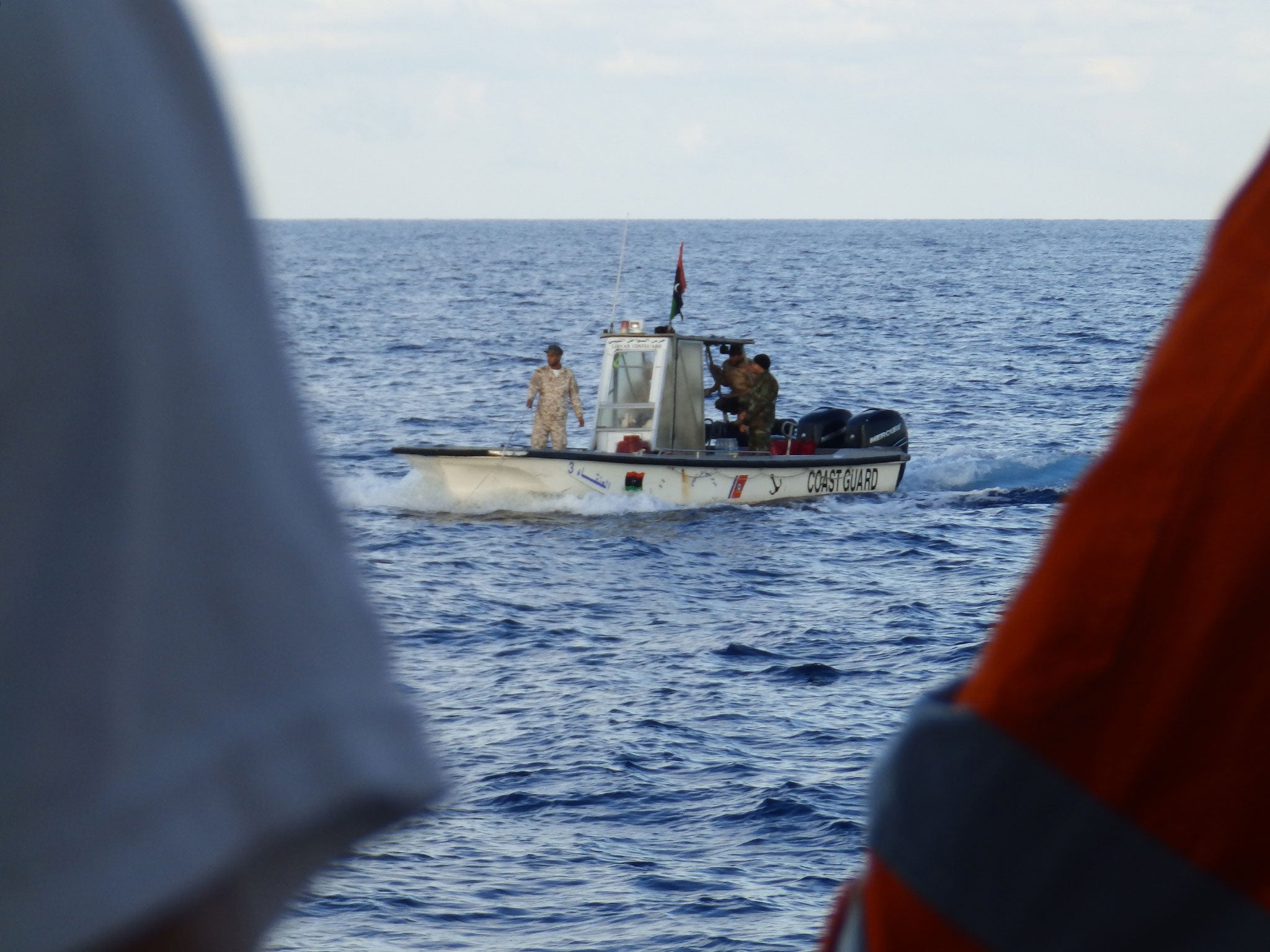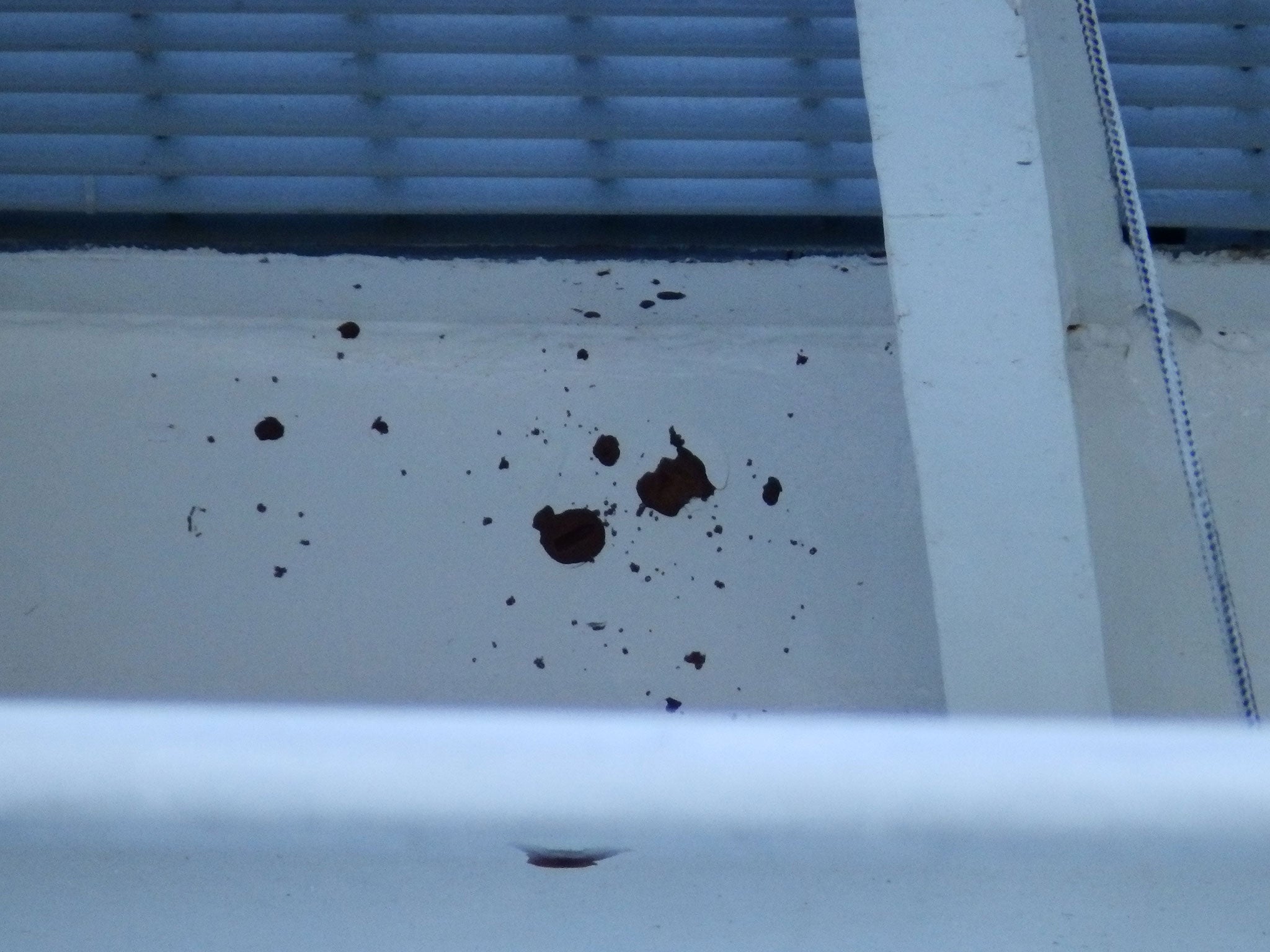Aid workers 'lucky to be alive' after Libyan coastguard intercepts refugee boat rescue in Mediterranean
More than 300 migrants forced back to Libya in alleged violation of international law
Volunteers say they are “lucky to be alive” after the Libyan coastguard cut across their ship to prevent them rescuing refugees in the Mediterranean amid record deaths at sea.
A vessel operated by German charity Sea-Watch was about to distribute life jackets to hundreds of migrants on an overloaded wooden fishing boat in international waters when the heavily armed ship approached.
Owen Thurgate, who was in a speedboat with an interpreter talking to those on board, said he received a radio alarm call saying a “warship” was coming in fast.
“When we looked over our shoulders a boat had just come around the bow of Sea-Watch and was heading towards us at high speed,” he added.
The charity filmed the moment the military vessel, carrying a long-range gun, passed within feet of the ship’s bow.
Ruben Lampart, captain of the Sea-Watch II, said he had “no idea” why the Libyans made the “very, very dangerous” manoeuvre after failing to respond to radio contact.

“I couldn’t avoid it,” he said. “They put their ship, my ship, the refugees, everybody in huge danger.
“We are all just happy that we are still alive…what happened is absolutely unacceptable.”
The Libyan coastguard was filmed forcing migrants from the fishing vessel on to their ship without life jackets – another decision aid workers claimed put lives at risk.
Sea-Watch received instruction from the Maritime Rescue Coordination Centre in Rome, which deployed it on the original rescue operation, saying that the Libyan coastguard was taking over “on-scene command”.
Ayoub Qassem, a spokesperson for the coastguard, said the incident occurred about 19 miles north of Libya's coast on Wednesday morning – outside the country’s territorial waters.
“An international rescue organisation called Sea-Watch tried to hinder the work of our coastguard in a bid to take the migrants, claiming Libya is not safe for migrants,” he said, adding that fire had been exchanged with people smugglers, without providing details.
Libyan officials said around 350 people on board the wooden boat were taken to a detention centre in Tripoli, although migrants told aid workers there were more than 500 people crammed on the deck and in the hold. At least five women needed immediate medical treatment.
The vessel had left the smuggling hub of Sabratha on Tuesday night, carrying asylum seekers from Morocco as well as other African nations and the Middle East.

One 24-year-old Moroccan man said he had come to Libya five weeks earlier in order to try to reach Europe, while a 28-year-old Moroccan had been working in the war-torn nation for four years but was forced to flee the deteriorating situation.
A Syrian woman had travelled through six countries to reach Libya, paying $1,000 (£780) in each and leaving two sons aged 12 and 13 behind in Jordan.
The Libyan coastguard, which has received offshore training from European nations including the UK, has previously been accused of shooting, beating and abusing migrants.
Officers opened fire on one aid agency’s ship last year, leaving its hospital riddled with bullet holes, while a previous attempt to block a Sea-Watch rescue in October resulted in the death of up to 25 refugees, who drowned after a coastguard officer started beating migrants on a rubber dinghy.
Libyan authorities frequently forcibly return refugee boats to land from both territorial and international waters – a move humanitarian agencies say violate international laws against refoulement.
The fragile Libyan Government of National Accord (GNA) has so far been unable to stem the ongoing civil war, seeing warring groups including two rival governments, tribes and Isis fight for territory.
Widespread lawlessness has allowed people smugglers to expand their lucrative trade, linking up with gangs who detain and extort migrants, ransoming them or forcing them into labour at “slave markets” and prostitution.
At least 20,000 migrants are believed to be held in irregular detention centres in the country, where survivors report torture, rape and starvation in dire conditions – sparking a probe by the International Criminal Court.
Moves by the EU to support detention centres as part of a package of support to bolster Libyan efforts against people smuggling and stem boat crossings in the Mediterranean Sea have been heavily criticised.
Italy signed a deal with the fragile Libyan Government of National Accord (GNA) in Tripoli in February that also promised training and money to fight human traffickers - an agreement initially endorsed by EU states at a summit in Malta.
The EU is also considering a request for equipment including ships armed with machine guns for the Libyan coastguard, which is attempting to increase its operations.
More than 1,300 migrants have died on the treacherous route so far this year, with 45,000 rescued and taken to Italy, while 5,600 have crossed the Aegean Sea between Turkey and Greece.
That route has slowed to a trickle since the controversial EU-Turkey deal came into force last March, seeing all asylum seekers arriving on Greek islands detained under threat of deportation.
But the prospect of implementing a similar agreement with Libya looks slim given the government’s reduced capacity and human rights concerns raised by the UN.
Filippo Grandi, the UN High Commissioner for Refugees, said record deaths in the Mediterranean Sea and mass arrivals showed rescue operations were “as crucial as ever”.
“Since the beginning of 2017, one person out of 35 has died on the sea journey from Libya to Italy…this cannot continue,” he said, calling for increased rescue efforts as well as work to address the root causes of migration.
“This is a matter of life or death which appeals to our most basic sense of humanity and should not be called into question.”
Update:
Jalal Othman, communications director for the GNA, told The Independent: “The Libyan Coast Guard is doing brave, difficult and dangerous work to save lives and protect the national coastline.
"We are aware of this accusation from Sea-Watch and have reviewed the video.
"We will continue to fulfill our mission to keep the coast safe and secure, providing vital rescue missions in cooperation with our partners.”
Join our commenting forum
Join thought-provoking conversations, follow other Independent readers and see their replies
Comments
Bookmark popover
Removed from bookmarks